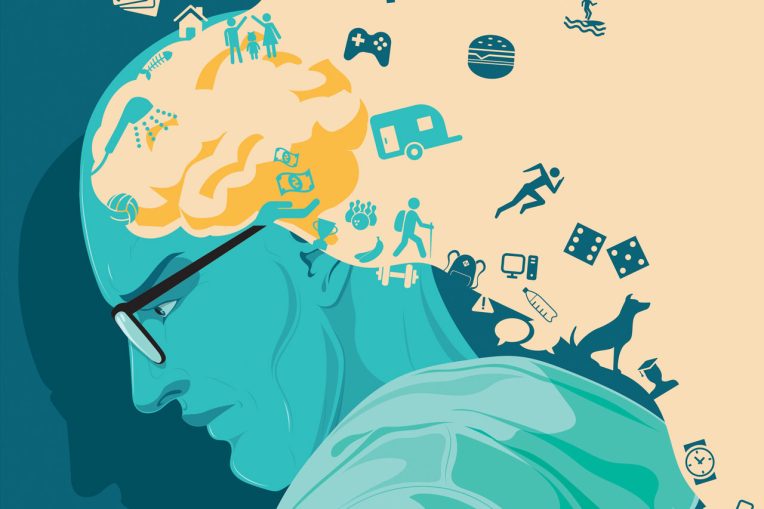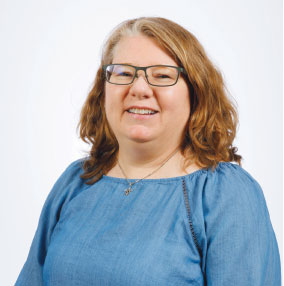Bed. Dream. Blanket. Rest.
Those words flash across a computer screen in front of a student research participant in a room not much larger than a closet. The screen goes blank, and after a brief pause or a distracting task such as a math problem, the research participant is asked a question: Was sleep one of the words on that list?
Appears InIt’s a simple experiment yet one that sheds light on the inner workings of human memory. If a research participant responds affirmatively—indicating “sleep” indeed was one of the words from the sequence—it’s a prime example of false memory.
Dr. Dawn M. McBride, professor of psychology, has been teaching and researching human memory for decades. Her interests include false memory, prospective memory, task order decisions, and facial recognition. She’s a widely published scholar who has presented her work around the world.
McBride arrived at Illinois State 25 years ago from Southern California to continue her scholarship on human memory that began when her interest was piqued in an undergraduate cognitive psychology course.
“I was hooked from Day One of the class,” McBride said. “I thought, ‘This is what I want to do.’”
You’re remembering it wrong.
Two tiny and sparsely furnished rooms in DeGarmo Hall’s basement serve as McBride’s Human Memory Lab. It’s a modest setting for conducting experiments using the Deese-Roediger-McDermott (DRM) paradigm, a complicated sounding name for a not-so-complicated procedure.
The DRM paradigm involves the presentation of related words and requires subjects to recall words from that list. Experiment participants can falsely recognize related words not on the list—referred to as “critical lures”—at rates of 50% or higher, demonstrating both the frequency of false memories and how quickly they can be created.
“Our memory is not perfect. In fact, we have false memories all the time,” McBride said. “Our memory helps us fill in pieces that might be missing based on association of things that are related.”
McBride uses her office as an example. After visiting the space, someone is likely to recall several items present. But it’s also likely they will name an item that wasn’t there based on their association of items commonly present in a professor’s office.
False memory occurs in the delay between experiencing something and having to recall it. Most false memories don’t affect us. But some do.
“False memories can affect things in a big way if you’ve witnessed a crime or been in an argument with someone who remembers things differently,” McBride said. “There are implications for everyday life.”
Why did I come in here?
Ever find yourself staring blankly at the contents of a refrigerator wondering why you left the couch? McBride has too.
But while most simply try to remember what brought us there, McBride wants to understand how our memory has failed us.
“Prospective memory is the kind of memory we use every day to remember to do things, and the busier we get, the harder that gets,” she explained. “We don’t intend to forget what we have to do in the future, but sometimes other cognitive processes take our attention away.”
Such distractions can come from any human sense. They could be as innocuous as catching a glimpse of a clock or hearing raindrops on a roof above.
“One of my biggest interests in memory is forgetting,” McBride said. “What happens when our attention gets shifted to something else? But what then helps us remember the thing we have to do later on?”
To better understand prospective memory, McBride and her student researchers have explored how delays affect prospective memory and examined the differences between time- and event-based memory cues.
“Whenever we have to remember to do something in the future, there’s a cognitive cost to the effort that goes into it.”
Dr. Dawn M. McBride
You’ve heard of procrastination. But have you heard of precrastination?
Research authored by University of California, Riverside Professor David Rosenbaum and others examined choices made by experiment participants tasked with selecting, lifting, and carrying a bucket while walking down a path lined with pairs of buckets. Surprisingly, most participants picked up the first bucket and ended up exerting more energy completing the task. The study found many people will complete a task as soon as possible—even if it requires extra effort—and asserts precrastinators make such decisions to free up mental bandwidth.
McBride’s research team is currently investigating precrastination in cognitive tasks. Specifically, the team has studied how research participants complete various tasks, such as sorting numbered boxes into odd and even groups on computer screens in the Human Memory Lab.
The research advances the psychology of why we do things in the order we do them—especially when that order seems illogical.
“Some people try to clear their minds of tasks so they can focus on other tasks and avoid some of the effort that goes into prospective memory,” McBride said. “Whenever we have to remember to do something in the future, there’s a cognitive cost to the effort that goes into it.”
Happy faces vs. angry faces
We rely on facial recognition every day, but we remember some faces better than others. Research hypothesizes that expressive emotion plays a role.
Based on a graduate student’s inquiry, McBride and student researchers are digging into this not-fully-understood form of memory. Some research contends humans are more likely to recognize happy faces than those expressing anger or sadness. Other research suggests the opposite.
“But one of the big differences between those sets of findings is how long they waited before testing people on the recognition of faces they studied,” McBride said.
The professor’s research interest in forgetting flips the question posed by previous researchers. Her research seeks knowledge of which types of facial emotions are more quickly forgotten.
“I’ve done a number of studies looking at what happens when we manipulate the delay,” she said. “What happens is you forget angry faces very quickly, whereas happy faces aren’t as well remembered initially, but they also don’t decline as fast.
“We don’t have a great explanation for it, so we’re doing more research.”
Not everyone agrees.
The study of human memory is not without controversy. Even the DRM paradigm, despite its wide academic acceptance, has been criticized for not reflecting real-life experience, based on the stimuli provided and the setting of such experiments.
McBride guards the integrity of her research through methodology. She teaches a course on research methods and has published a widely used textbook, The Process of Research in Psychology, now in its fifth edition.
“Dawn inspires how I teach. I still use her textbook,” said Dr. Jen Coane ’01, M.S. ’04, an alum of McBride’s Human Memory Lab and an associate professor of psychology at Colby College. “I tell my students this is the person who gave me my start, and we’re using her book. I don’t apologize for it.”
Coane said she was privileged to learn under McBride. They still collaborate on research.
“I’ve met others who went through her lab after me, and she’s trained an excellent bunch of students,” Coane said. “They have solid training in experimental design, research methods, research ethics—you know, those things that matter.”
A lasting memory
When McBride arrived on Illinois State’s campus, she proposed a course focused on memory. She’s led sections of PSY 368: Human Memory ever since. A handful of students from that class end up in McBride’s lab. Coane is one of several former student researchers who have gone on to teach and lead their own research teams. Dr. Chris Wahlheim ’04, M.S. ’06, is another. He’s an associate professor of psychology at the University of North Carolina Greensboro.
“She was always patient, but firm when I needed it. She was honest and direct, and that’s what I needed at the time,” Wahlheim said. “Her influence is really what got me into psychology as a career. It’s a life I never would have dreamed of, and she was the foundation for it.”
Wahlheim admires McBride’s steadfast commitment to student success. He said its sadly uncommon in the highly competitive research community. “It’s commendable that in a profession where people often focus on themselves in order to move their careers forward, she’s been able to do that while also bringing along another generation of scholars,” he said.
McBride’s impact is indeed reaching another generation. One of Wahlheim’s first Ph.D. students, who recently earned a faculty position at Millikin University, presented at Illinois State last spring. McBride was in attendance.
“She’s sort of my academic granddaughter,” McBride said, smiling.
McBride is highly respected in memory research circles. A doctoral candidate at Brandeis University, Elizabeth Marsh ’20, M.S. ’22, has experienced it. “I was just at a conference presenting a poster from work in her lab, and it was unbelievable how many people stopped just because they saw her name on it,” Marsh said.
Marsh too is one of the many budding limbs of McBride’s extensive “family tree” of researchers.
“I’m very lucky to have had the opportunity to work with her,” Marsh said. “There’s no aspect of my academic career she hasn’t influenced.”
McBride relishes the opportunity. The balance between teaching and research was one of the aspects of the job that drew her to Illinois State.
“Working one-on-one with students has always been one of the best parts of the job,” McBride said. “Students seem to get an awful lot more excited about being part of the research process than sitting in a lecture.
“I get to know them well, learn their goals, help them go to grad school, and all that. I really enjoy it, and that’s what I’ll remember.”
Shared false memories
Do you remember The Berenstein Bears books? If so, you have a shared false memory.
The series of children’s books following a family of problem-solving, lesson-learning bears has sold over 200 million copies, yet many readers falsely remember the title family name as Berenstein (bare-un-STEEN) and not the correct Berenstain (bare-un-STAIN).
It’s a common shared false memory. This is also known as the “Mandela Effect,” so named for widespread and vivid memories of news coverage of Nelson Mandela’s death and funeral in the 1980s despite the anti-apartheid leader’s death not occurring until 2013.
Other examples of shared false memories include Mr. Monopoly wearing a monocle, the Fruit of the Loom logo containing a cornucopia, and commonly misquoted movie dialogue. (Spoiler alert: Darth Vader never says, “Luke, I am your father,” in The Empire Strikes Back.)
Theories explaining shared false memories differ; some are as fantastical as time travel or the existence of parallel universes.
Dr. Dawn McBride has a simpler explanation.
“People can have the same false memory because memory works similarly for people, especially if they’re from the same culture,” she said. “People who don’t remember details will fill them in as best they can, based on their own background and experience, and people with shared backgrounds and experiences will fill those details in, in a very similar way.”


